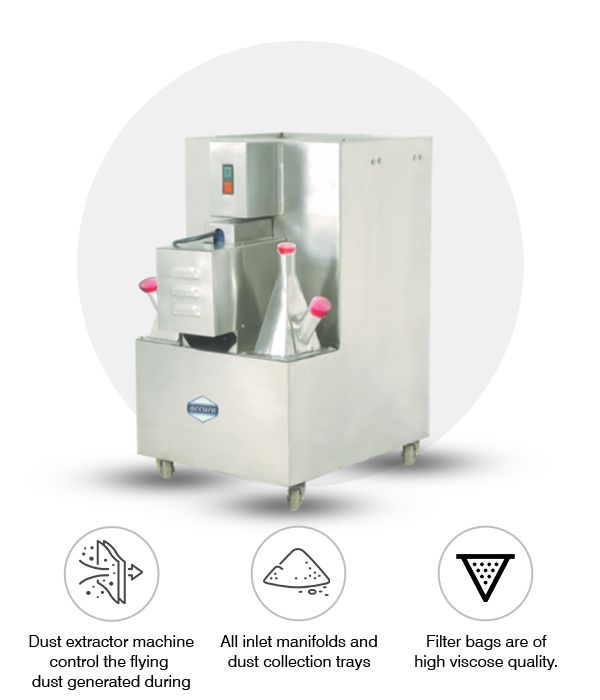Dust Extractors for Contamination-Free Tablet Production in Spain
The purpose of this article is to explore how Dust Extractors contribute to creating and maintaining a contamination-free environment in tablet production facilities in Spain. We will examine how these machines control dust, reduce cross-contamination risks and ensure a cleaner, safer production process for Spain's pharmaceutical industry.
Role of Dust Extractors in Maintaining Clean Tablet Production in Spain
In the pharmaceutical industry, especially in tablet manufacturing, maintaining a clean and contamination-free environment is essential to ensure the production of high-quality products. One of the main challenges in tablet production is controlling the dust generated during the compression process. Dust Extractor Machines are crucial in this context, as they help capture and remove dust particles that could otherwise contaminate the production environment, machinery and final products.
In Spain, the pharmaceutical industry is one of the largest sectors, with numerous manufacturers focusing on high-quality production and compliance with strict regulatory standards. The demand for dust extraction machines is growing as these systems provide an effective solution to address contamination risks. This article delves into how dust extractors play a vital role in ensuring a clean, contamination-free environment in Spain's tablet production.
How Do Dust Extractors Help Maintain a Clean Environment in Tablet Production?
Tablet manufacturing involves the compression of powdered materials, which generates fine dust particles. These particles can spread across the production area, settling on machines, tools and even products. If left unchecked, the dust can lead to contamination, increased mechanical wear and potential product quality issues.
Dust Extractor Machines are specifically designed to control and remove these airborne dust particles. The machine uses advanced filtration systems, including high-viscose cloth filters, to capture the dust and prevent it from circulating in the production area. In Spain’s tablet production, this ensures that the tablet press machines remain free from dust build-up, preventing contamination of the products and ensuring that the manufacturing process adheres to the highest cleanliness standards.
By extracting the dust generated during compression, dust extractors contribute to maintaining a clean environment and reducing the risk of contamination in both the machinery and the final tablets. This also helps meet the stringent regulations imposed by Spain’s health authorities.
Read Our Article: Importance of Dust Extractor in Medicinal Industry
What Role Do Dust Extractors Play in Preventing Cross-Contamination?
Cross-contamination is one of the primary concerns in pharmaceutical manufacturing, especially when different types of tablets are produced in the same facility. Dust particles generated during the compression process may carry traces of active ingredients or other substances, which can cause cross-contamination if they spread between batches.
In Spain’s pharmaceutical sector, where multiple products are manufactured in close proximity, dust extraction machines are crucial in preventing such risks. The dust extractors work by capturing airborne particles before they can spread throughout the facility, effectively preventing cross-contamination between batches. With the help of dust extractors, manufacturers can ensure that each batch remains pure, maintaining both the quality and integrity of the tablets produced.
The use of dust extraction systems is a vital part of complying with both local and international pharmaceutical manufacturing standards, which emphasize the importance of contamination control.
Related Machine: Dust Extractor (300 CFM)

How Do Dust Extractors Improve Machine Longevity in Tablet Production?
The dust generated during the tablet compression process not only poses a contamination risk but also contributes to the wear and tear of tablet press machines. Dust particles can settle on various machine components, such as punches, dies and cams, causing abrasion and friction. Over time, this can lead to mechanical strain, increased maintenance costs and shorter machine lifespans.
By removing dust from the production environment, dust extractor machines prevent these particles from settling on critical parts of the tablet press machine. This reduces the friction between moving components, minimizing mechanical wear and tear. As a result, the tablet press machines operate more smoothly, experience fewer breakdowns and require less maintenance. For manufacturers in Spain, this contributes to increased machine efficiency and lower operating costs, while also extending the lifespan of their tablet production equipment.
Read Our Article: How Dust Extractors Reduce the Risk of Respiratory Issues in Tablet Manufacturing Workers?
How Do Dust Extractors Comply with Spain’s Pharmaceutical Manufacturing Standards?
Spain’s pharmaceutical industry is highly regulated, with strict cleanliness and contamination control standards set by both national and international regulatory bodies. In tablet production, adhering to these standards is crucial not only for product quality but also for ensuring that the manufacturing process is safe and hygienic.
Dust Extractor Machines help pharmaceutical companies in Spain meet these regulatory requirements by maintaining a clean and controlled environment. The advanced filtration systems used in these machines are designed to trap dust particles and prevent them from contaminating the production area. Moreover, the use of stainless steel components in dust extractors ensures durability and hygiene, as stainless steel is resistant to corrosion and easier to clean.
By integrating dust extraction systems into their operations, manufacturers can comply with Spain’s pharmaceutical manufacturing standards, which require the control of airborne particulates to prevent contamination and ensure the safety and efficacy of the final product.
How Do Dust Extractors Enhance Overall Production Efficiency in Spain?
Production efficiency is a critical factor in tablet manufacturing, especially as demand increases and production volumes rise. Dust extraction machines help improve production efficiency by ensuring that the tablet press machines run smoothly without being hampered by dust-related issues.
With dust extractors in place, manufacturers in Spain can reduce the frequency of maintenance and downtime associated with dust build-up. Machines operate more efficiently and tablet production continues without unnecessary interruptions. Furthermore, the cleaner environment reduces the risk of defects in the final product, ensuring that tablets are produced to the highest quality standards.
Additionally, dust extractors help to minimize the potential for mechanical strain on the tablet press machines, which further enhances overall production efficiency. By improving both machine performance and product quality, dust extractors contribute to a more streamlined and cost-effective manufacturing process.
Impact of Dust Extractor Machines on Clean Tablet Production in Spain
Dust Extractor Machines play a critical role in ensuring a contamination-free environment in Spain's tablet production. These machines are essential in controlling the dust generated during the compression process, preventing contamination of both the machinery and the final product. By effectively capturing dust particles, dust extractors help reduce mechanical strain on tablet press machines, improve their longevity and enhance overall production efficiency.
In Spain, where pharmaceutical manufacturing is a vital sector, the use of dust extraction systems is integral to complying with regulatory standards and maintaining high-quality tablet production. As demand for pharmaceutical products continues to rise, the importance of dust extractors in creating a clean and safe manufacturing environment will only increase.





